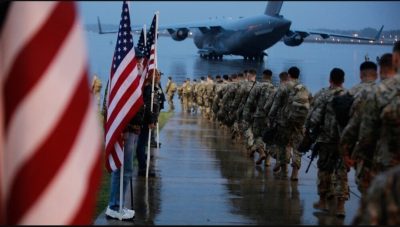Iraqi Prime Minister Supports Open-Ended US Troop Presence
The US has about 2,500 troops in Iraq, a presence that supports the US occupation of eastern Syria

All Global Research articles can be read in 51 languages by activating the Translate Website button below the author’s name.
To receive Global Research’s Daily Newsletter (selected articles), click here.
Follow us on Instagram and Twitter and subscribe to our Telegram Channel. Feel free to repost and share widely Global Research articles.
***
Iraq’s new prime minister told The Wall Street Journal in an interview published on Sunday that he supports a continued US troop presence in Iraq, breaking the silence on the issue since he came into office in October 2022.
“We think that we need the foreign forces,” Prime Minister Mohammed al-Sudani said. The US currently has about 2,500 troops in Iraq, but the presence is a divisive issue in Iraqi politics as al-Sudani’s supporters and Iraqi Shia groups have pressed him to reconsider the stationing of US forces in the country.
American troops are in the country to train government forces against ISIS, but in recent years, the US has been at odds with Iraqi Shia militias that it once allied with to fight ISIS. Tensions came to a head in January 2020 when the US killed Iranian Gen. Qasem Soleimani and Iraqi militia leader Abu Mahdi al-Muhandis in a drone strike in Baghdad.
Al-Muhandis led the Popular Mobilization Forces (PMF), a group of mostly Shia militias formed in 2014 to fight ISIS. The drone strike enraged many in Iraq, and Iraq’s parliament voted to expel US forces shortly after, but the US refused to leave.
Former Iraqi Prime Minister Mustafa al-Kadhimi, who came into office in May 2020, was under a lot of pressure to get the US to leave the country. The pressure led to Kadhimi working out a deal that led to the US formally ending its “combat mission” in Iraq, changing it to an “advisory role.” But changing the name of the US mission in Iraq had virtually no impact on the US presence on the ground as no troops were withdrawn.
A major reason for the continued US presence in Iraq is that it supports the US occupation of eastern Syria, where there are about 1,000 American troops. The US backs the Kurdish-led SDF in Syria against ISIS, but the presence is also part of the economic war against Damascus, as the US has Syria under crippling economic sanctions with the purpose of preventing the country’s reconstruction.
Sudani recognized that the US presence in Iraq is necessary to support US forces in Syria. He said it was needed to prevent a resurgence of ISIS in Syria, although the Syrian government is a sworn enemy of ISIS and would work with its allies to keep the group from regaining a foothold in eastern Syria if the US withdrew.
Sudani was voted into office by Iraq’s parliament after a year-long political stand-off between influential Shia cleric Moqtada al-Sadr and his opponents in parliament. Sadr’s party won the most seats in Iraq’s October 2021 elections but failed to form a government, and the tensions culminated in violent clashes in Baghdad that took place over the summer.
Unlike most factions in Iraq, Sadr wants the country to be independent of both the US and Iran and is against the US troop presence. Sudani is taking a different approach and told The Wall Street Journal that he hopes to have good relations with both the US and Iran. “I don’t see this as an impossible matter, to see Iraq have a good relationship with Iran and the US,” he said.
As long as the US remains in Iraq and Syria, it risks sparking a wider war with Iraqi Shia militias and possibly Iran. US bases in the two countries frequently come under rocket attack. While there have rarely been casualties in the recent attacks, the US has previously escalated the situation and launched major airstrikes in response, even though it’s impossible to know who was responsible.
*
Note to readers: Please click the share buttons above. Follow us on Instagram and Twitter and subscribe to our Telegram Channel. Feel free to repost and share widely Global Research articles.
Dave DeCamp is the news editor of Antiwar.com, follow him on Twitter @decampdave.
Featured image is from Mideast Discourse

